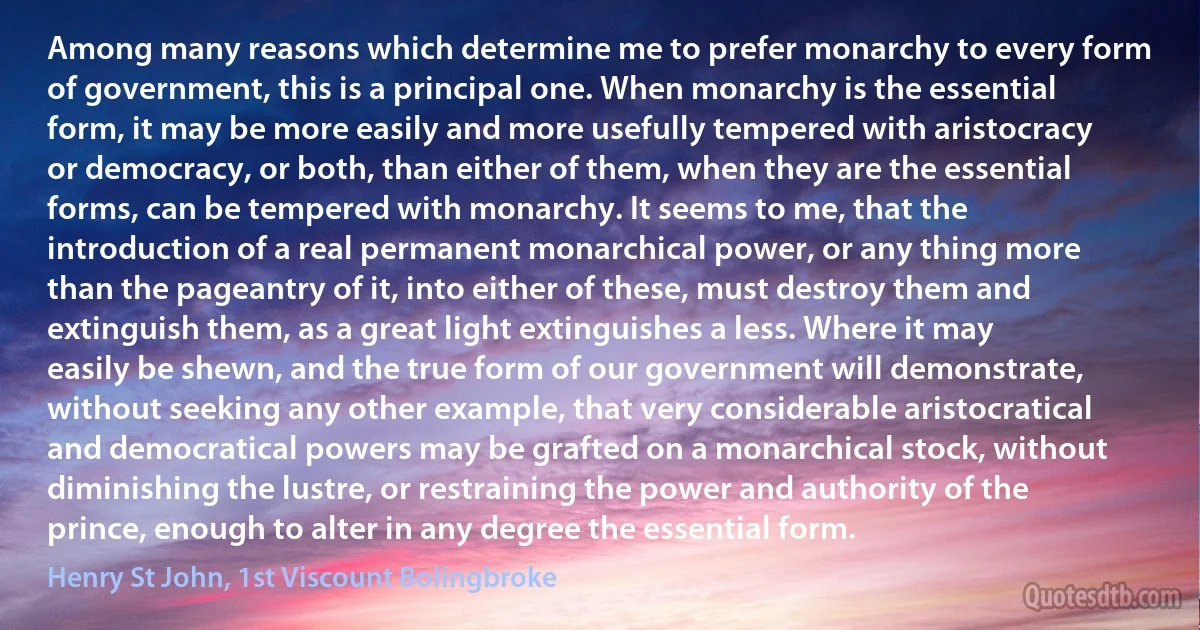
Among many reasons which determine me to prefer monarchy to every form of government, this is a principal one. When monarchy is the essential form, it may be more easily and more usefully tempered with aristocracy or democracy, or both, than either of them, when they are the essential forms, can be tempered with monarchy. It seems to me, that the introduction of a real permanent monarchical power, or any thing more than the pageantry of it, into either of these, must destroy them and extinguish them, as a great light extinguishes a less. Where it may easily be shewn, and the true form of our government will demonstrate, without seeking any other example, that very considerable aristocratical and democratical powers may be grafted on a monarchical stock, without diminishing the lustre, or restraining the power and authority of the prince, enough to alter in any degree the essential form.
Henry St John, 1st Viscount BolingbrokeRelated topics
aristocracy authority degree enough example form government great less light lustre monarchy pageantry power prince principal real restraining seeking thingRelated quotes
I am aware that the age is not what we all wish. But I am sure, that the only means of checking its precipitate degeneracy, is heartily to concur with whatever is the best in our time; and to have some more correct standard of judging what that best is, than the transient and uncertain favour of a court. If once we are able to find, and can prevail on ourselves to strengthen an union of such men, whatever accidentally becomes indisposed to ill-exercised power, even by the ordinary operation of human passions, must join with that society, and cannot long be joined, without in some degree assimilating to it. Virtue will catch as well as vice by contact; and the public stock of honest manly principle will daily accumulate. We are not too nicely to scrutinize motives as long as action is irreproachable. It is enough, (and for a worthy man perhaps too much,) to deal out its infamy to convicted guilt and declared apostacy.

Edmund Burke
"They say that a military confrontation with Iran would undermine the efforts already underway, that it would be ineffective, and that it would provoke even more vindictive action by Iran. I've heard these arguments before. In fact, I've read them before. In my desk, I have copies of an exchange of letters between the World Jewish Congress and the US War Department. The year was 1944. The World Jewish Congress implored the American government to bomb Auschwitz. The reply came five days later. I want to read it to you: "Such an operation could be executed only by diverting considerable air support essential to the success of our forces elsewhere... and in any case would be of such doubtful efficacy that it would not warrant the use of our resources”... And here's the most remarkable sentence of all. And I quote: "Such an effort might provoke even more vindictive action by the Germans.” Think about that – "even more vindictive action”.

Benjamin Netanyahu
First of all I want to remind you of the essential features of models. In my opinion they are: (i) drawing up a list of the variables to be considered; (ii) drawing up a list of the equations or relations the variables have to obey and (iii) testing the validity of the equations, which implies the estimation of their coefficients, if any. As a consequence of especially (iii) we may have to revise (i) and (ii) so as to arrive at a satisfactory degree of realism of the theory embodied in the model. Then, the model may be used for various purposes, that is, for the solution of various problems. The advantages of models are, on one hand, that they force us to present a "complete" theory by which I mean a theory taking into account all relevant phenomena and relations and, on the other hand, the confrontation with observation, that is, reality. Of course these remarks are far from new.

Jan Tinbergen
Islam proclaims monarchy and hereditary succession wrong and invalid. When Islam first appeared in Iran, the Byzantine Empire, Egypt, and the Yemen, the entire institution of monarchy was abolished. In the blessed letters that the Most Noble Messenger (peace and blessings be upon him) wrote to the Byzantine Emperor Heraclius and the Shahanshah of Iran, he called upon them to abandon the monarchical and imperial form of government, to cease compelling the servants of God to worship them with absolute obedience, and to permit men to worship God, Who has no partner and is the True Monarch. Monarchy and hereditary succession represent the same sinister, evil system of government that prompted the Lord of the Martyrs (Hussain bin Ali -- peace be upon him) to rise up in revolt and seek martyrdom in an effort to prevent its establishment. He revolted in repudiation of the hereditary succession of Yazid, to refuse it his recognition.

Ruhollah Khomeini
Wherever big industries displaced manufacture, the bourgeoisie developed in wealth and power to the utmost and made itself the first class of the country. The result was that wherever this happened, the bourgeoisie took political power into its own hands and displaced the hitherto ruling classes, the aristocracy, the guildmasters, and their representative, the absolute monarchy. The bourgeoisie annihilated the power of the aristocracy, the nobility, by abolishing the entailment of estates – in other words, by making landed property subject to purchase and sale, and by doing away with the special privileges of the nobility. It destroyed the power of the guildmasters by abolishing guilds and handicraft privileges. In their place, it put competition – that is, a state of society in which everyone has the right to enter into any branch of industry, the only obstacle being a lack of the necessary capital.

Friedrich Engels
